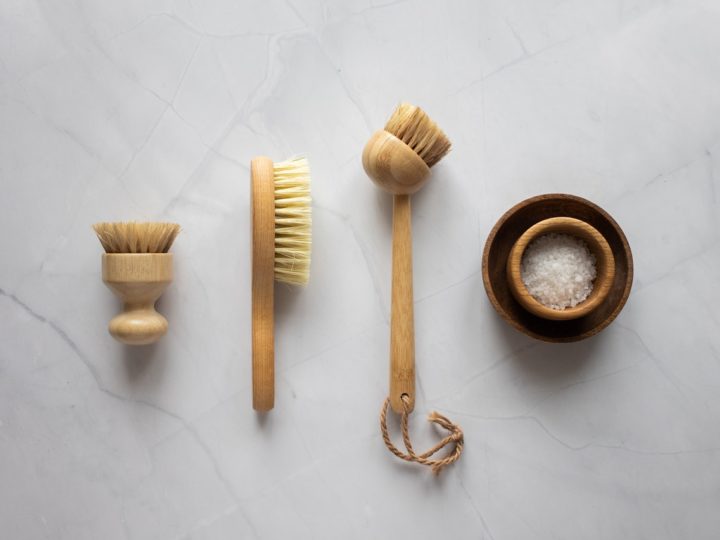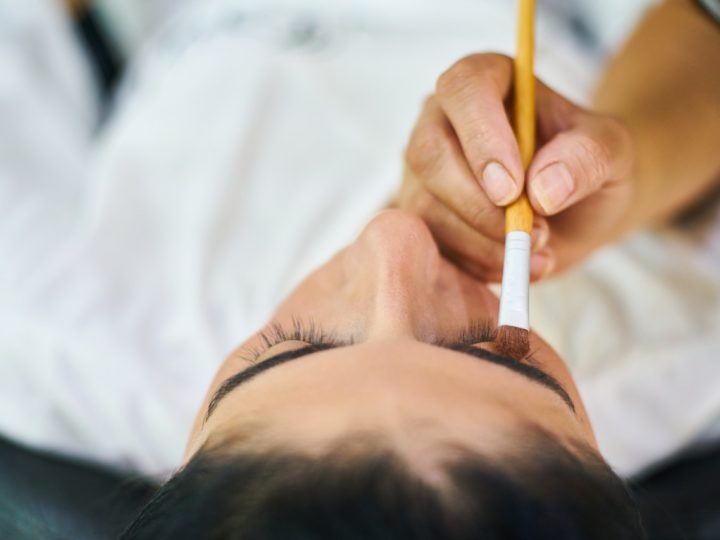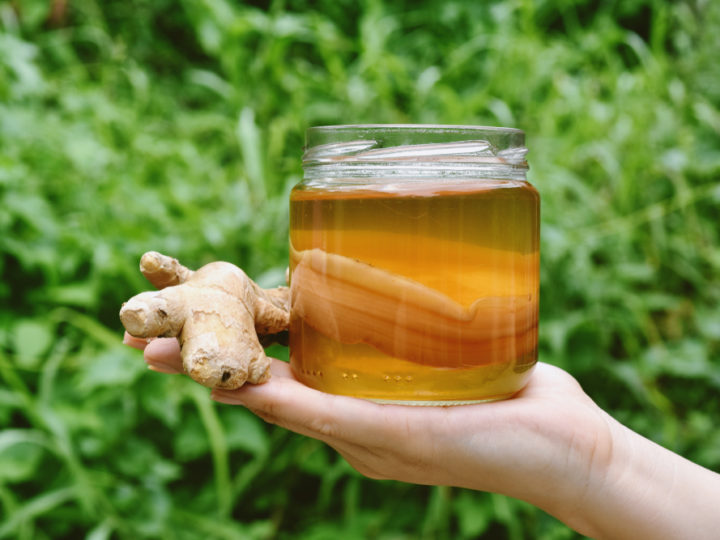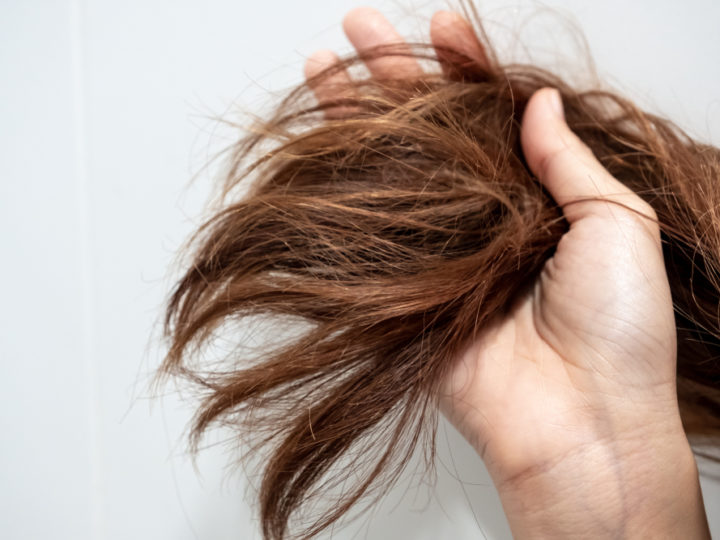GOT DANDRUFF?
Eastern Medicine May Have The Answer

Oh dreaded dandruff. Itchy and embarrassing, who knew little white flakes could cause such a problem. Dandruff is among the most common scalp disorders, with almost half of the population experiencing it at some stage in their life.
If you’ve had it before you know it can be annoying and tough to get rid of. The shampoos don’t cut it, and often just when you think it’s gone, it comes back. So how do you get rid of it and make sure it’s gone for good? Eastern medicine may have the answers.
Eastern medicine takes a look at dandruff from a systematic point of view. It focuses on a microbiological understanding of the body and pairs that with comprehensive, holistic treatments. By approaching dandruff this way, the issue is dealt with at the source.
What is Dandruff?
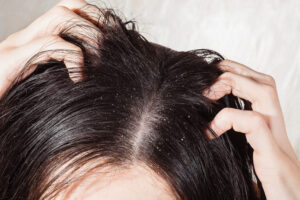 Dandruff is a non-inflammatory condition that dominantly affects the skin on the scalp. It is not contagious and not life-threatening.
Dandruff is a non-inflammatory condition that dominantly affects the skin on the scalp. It is not contagious and not life-threatening.
So, the problem with dandruff is usually more of an aesthetic or “appearance” issue. Most people who have dandruff find it embarrassing because the flakes are visible to others. Dandruff is also a quite itchy and annoying skin condition.
The skin under one’s hair will begin to dry up and flake, detaching from the scalp upon scratching or shaking the head. The flakes may be easily seen in the hair or on dark clothing. So, if you see white flakes when grooming your scalp, you’ve most likely got dandruff.
What Contributes to Dandruff?
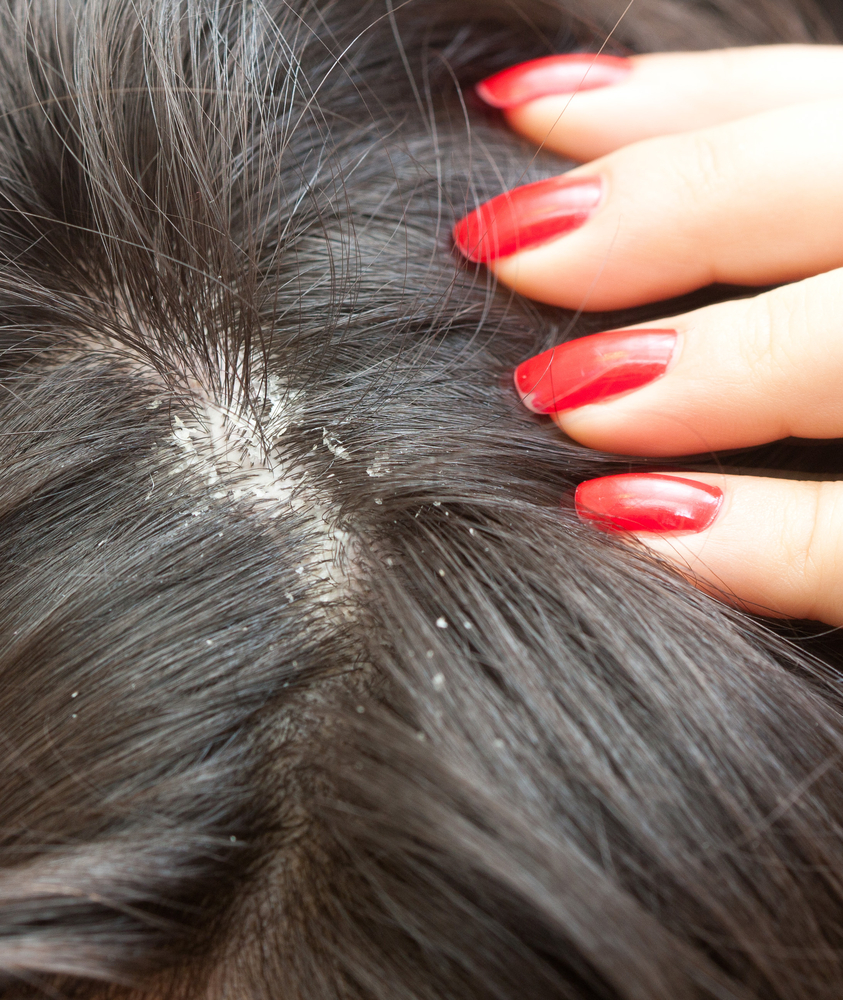 The real cause for dandruff is not clearly defined, but both Western and traditional Chinese medicine have their own take on what contributes to dandruff.
The real cause for dandruff is not clearly defined, but both Western and traditional Chinese medicine have their own take on what contributes to dandruff.
This scientific research article published by the Indian Journal of Dermatology breaks down- in great depth- what biological factors may cause dandruff.
In simple terms, dandruff is usually caused by too much oil on the scalp. It could occur from a combination of elements or a single factor, the most common of which is not shampooing the hair properly.
Overusing hair products could cause a reaction in the hair that triggers dandruff, or the condition could even be hereditary too.
If one is prone to other skin conditions such as eczema or psoriasis, then in some cases, dandruff could be a product of those issues as well.
What Does TCM Think of Dandruff?
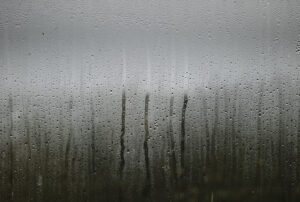 In the realm of traditional Chinese medicine, dandruff is seen as the result of excess damp heat. Damp translates to oiliness, and heat translates to redness or irritation.
In the realm of traditional Chinese medicine, dandruff is seen as the result of excess damp heat. Damp translates to oiliness, and heat translates to redness or irritation.
TCM believes damp heat is related to a lack of cooling energy flowing through the body. Dandruff could also be caused by yin deficiency, in which case you would be dealing with a dry scalp.
Either way, both damp heat and yin deficiency are related to how qi flows to the head and through the body’s meridian system.
When the body is in a damp heat state, it is predisposed to yeast called Malassezia. This yeast thrives off the oils on one’s scalp, when they are in excess, and breaks those oils down into a foreign oil that the scalp does not react well to.
Thus, the dandruff formation process is initiated.
This is why TCM does not use oil-based products to treat dandruff. Instead, TCM turns to herbal remedies and natural anti-fungal creams that are created to fight the problem at the source.
How to Prevent & Ease Dandruff
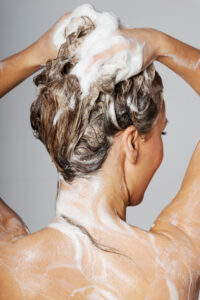 If you find yourself with a budding case of dandruff, the first thing to do is properly shampoo your hair and give it a good wash. Thoroughly rinse your hair with vinegar to ensure no shampoo is left over to eliminate the possibility that it is an irritant.
If you find yourself with a budding case of dandruff, the first thing to do is properly shampoo your hair and give it a good wash. Thoroughly rinse your hair with vinegar to ensure no shampoo is left over to eliminate the possibility that it is an irritant.
Some shampoos and hair products contain harmful ingredients that react poorly to the skin, so opt for natural products. Vinegar, tea tree oil, aloe vera, eucalyptus, and burdock root are a few key ingredients to look for in shampoos and conditioners.
On a dietary level, TCM says to avoid dairy products, eggs, gluten, and refined sugars or fats. It’s no mystery that a balanced, healthy diet will contribute to overall wellness. Consume vitamin-rich foods to boost your vitamin A, C, B, E, and zinc levels.
When one is overly stressed, hair follicles do not grow, and hair can even be pushed out of the scalp. This leaves the scalp feeling heavily irritated. Staying relaxed and watching your stress levels is another way to prevent the onset of dandruff.
In some cases, a traditional Chinese medicine practitioner might recommend acupuncture to get rid of dandruff. This is if it is seen as a byproduct of a severe underlying condition. If you are not experiencing intense scalp irritation (puss, thick patches, scaley skin, deep redness), TCM herbal remedies can offer relief.
Say Bye-Bye to Dandruff with TCM Herbal Remedies
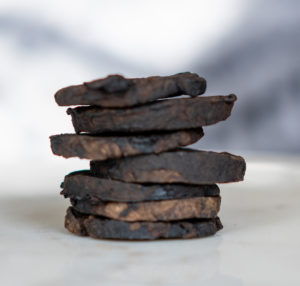 A TCM practitioner can properly diagnose one’s dandruff condition and provide the proper treatment plan to get rid of dandruff. As previously mentioned, most TCM experts would recommend using natural herbal remedies and avoiding oil-based products.
A TCM practitioner can properly diagnose one’s dandruff condition and provide the proper treatment plan to get rid of dandruff. As previously mentioned, most TCM experts would recommend using natural herbal remedies and avoiding oil-based products.
A few cooling and hydrating herbs you could use are Rehmannia, Scrophularia, Tribulus fruit, Dictamnus, and Sophora. These are just a few of the many herbs that TCM keeps in its arsenal for fighting dandruff.
Oral Herbal Remedy for Blood Deficiency + Excess Dryness & Wind
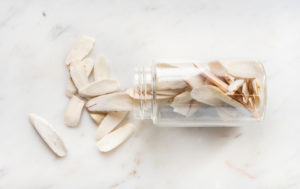 You may be experiencing a blood deficiency + excess dryness & wind if your scalp is dry, flaky, itchy, and your symptoms include dizziness, pale color, hard stool, and a slow pulse on the tongue. This condition usually occurs around winter and spring months due to temperature and air-quality changes.
You may be experiencing a blood deficiency + excess dryness & wind if your scalp is dry, flaky, itchy, and your symptoms include dizziness, pale color, hard stool, and a slow pulse on the tongue. This condition usually occurs around winter and spring months due to temperature and air-quality changes.
An oral herbal TCM remedy for this condition may include:
- Sour jujube seed
- Polygala root
- Angelica root
- White peony root
- Caltrop fruit
- Astragalus root
- Licorice root
- Ginger
Oral Herbal Remedy for Dampness and Wind + Excess Heat
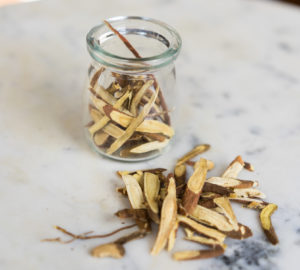
You may be experiencing dampness and wind + excess heat if your scalp is itching, showing signs of bleeding scratch marks, appears slightly swollen, or feels like eczema. This condition occurs most often in the summer and fall months.
An oral herbal TCM remedy for this condition may include:
-
- Phellodendron bark
- Peony root bark
- Angelica root
- Ledebouriella root
- Cicada moultings
- Sesame seed
- Licorice root
- Akebia stem
- Sophora root
External TCM Herbal Remedies for Dandruff
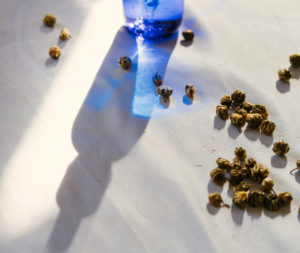 Aside from oral concoctions, Traditional Chinese Medicine also recommends using external remedies to treat dandruff. External ointments, salves and rinses are applied directly to the scalp, attacking irritation head-on (literally).
Aside from oral concoctions, Traditional Chinese Medicine also recommends using external remedies to treat dandruff. External ointments, salves and rinses are applied directly to the scalp, attacking irritation head-on (literally).
All of the herbal ingredients used in dandruff-fighting recipes are meant to remove bacteria, improve blood circulation, stop itchiness, and balance out the scalp to get rid of dandruff.
External TCM herbal remedies for dandruff may include:
- Mulberry leaf mixed with water
- Sophora root, chrysanthemum, and dictamnus bark mixed with water
- Ground mixture of vitex fruit, mulberry mistletoe, hemp seed, angelica root, and ledebouriella root
Extra Tips for Getting Rid of Dandruff Fast
Using salves and drinking herbal decoctions (strong teas) play a huge role in traditional Chinese medicine. However, there are a few extra practices you can do that will help get rid of dandruff quickly.
- Don’t scratch your scalp with your nails. It’s best not to scratch at all, but if you cannot resist, pat your scalp with your palm or the pads of your fingers.
- Keep your stress levels low as much as possible.
- Opt for natural haircare products, and avoid using too many products in your hair.
- Wash your hair often- scalp only- to keep oil levels maintained.
- Eat a balanced diet full of zinc and vitamins A, B, C, & E.
- Try juicing celery, tomato, pear, and other hydration-packed fruits and vegetables.
An itchy, flaky scalp is never any fun. Traditional Chinese Medicine works wonders when paired with self-care practices like exercise and healthy diets. Try different TCM remedies until you find the combination that works best for you.
Comments (0)
Leave a reply
You must be logged in to post a comment.

